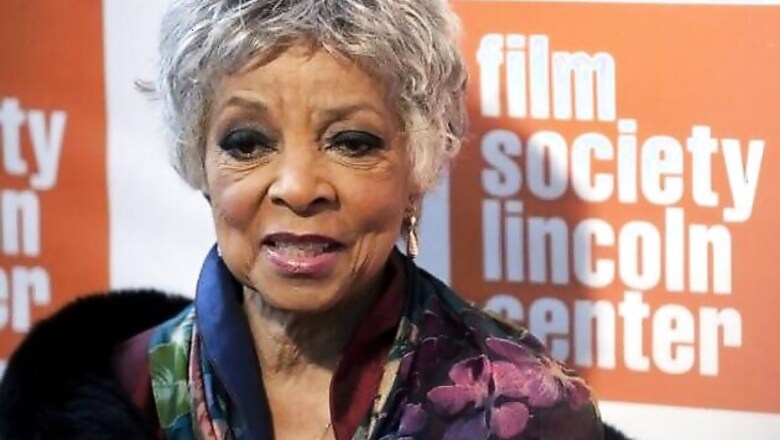
views
Reuters: Legendary stage and screen actress Ruby Dee, who won acclaim in theater, film and television and became a notable figure in the U.S. civil rights movement, died peacefully at home, a friend of the family said on Thursday.
The actress, who was 91 years old, died on Wednesday night in New Rochelle, New York, surrounded by her family.
"She died of natural causes," said Arminda Thomas, who works for Dee's family. "She was blessed with old age."
The petite actress won an Oscar nomination in 2008 for her role in "American Gangster." After being nominated for six Emmys, she nabbed the award in 1991 for her role in the TV movie "Decoration Day."
Dee was married to actor Ossie Davis for 56 years until his death in 2005. The couple, who had three children, formed a productive and enduring artistic and activist partnership. They performed together in plays and films and appeared together at some of the seminal events of the turbulent civil rights era.
The actress broke free from the racially stereotypical roles often given to black actresses when she began her career in the 1940s and continued to act into her 90s.
"Ruby Dee inspired so many people both on stage and off. At the Tony Awards last Sunday, both Audra McDonald and Kenny Leon paid tribute to Ruby Dee during their acceptance speeches," said Charlotte St. Martin, executive director of the Broadway League, which represents producers and theater owners.
Broadway theaters will dim their marquees on Friday in Dee's memory.
President Barack Obama recalled Dee's performance in the 1989 Spike Lee film, "Do the Right Thing" - which the president and his wife, Michelle, saw on their first date.
"Through her remarkable performances, Ruby paved the way for generations of black actors and actresses, and inspired African-American women across our country," Obama said in a statement.
Friends and fans also turned to Twitter to express their sadness.
"Words cannot express how much Ruby Dee inspired me to be who I am today. I will miss her dearly ...," hip-hop mogul Russell Simmons tweeted.
Director Spike Lee said he was "crushed" and actress Angela Lansbury described Dee's death as "an irreplaceable loss."
Dee and Davis were equally famous for their political activism, even as they paid a price in terms of their careers. They denounced Senator Joseph McCarthy's anti-Communist crusades of the 1950s and were blacklisted for a time. They also were investigated by FBI chief J. Edgar Hoover's agents. They counted civil rights leader Martin Luther King and black activist Malcolm X among their friends and took part in marches for racial equality in the South. Dee and Davis were emcees of the landmark 1963 March on Washington where King gave his "I Have a Dream" speech. The couple were honored in 2004 at the Kennedy Center in Washington for their lifetime contributions to theater, TV and movies, as well as their advocacy for equality. The Kennedy Center recognized them as "two of the most prolific and fearless artists in American culture," stating: "With courage and tenacity they have thrown open many a door previously shut tight to African American artists and planted the seed for the flowering of America's multicultural humanity."
Dee was born as Ruby Ann Wallace in Cleveland, the daughter of a train porter and a schoolteacher, and was raised in the Harlem section of New York City.
She attended Hunter College in New York, then joined the American Negro Theater in 1941 before making her way to Broadway.
In 1946, she appeared on Broadway with Davis, who also became a director and playwright, in "Jeb," about a black soldier back from World War Two who confronts the white supremacist Ku Klux Klan.
Dee's films include "The Jackie Robinson Story" (1950) in which she co-starred with Robinson, portraying himself in the tale of major league baseball's first black player, as well as "A Raisin in the Sun" (1961) with Sidney Poitier.
(Changes to their from his first date in paragraph 9)


















Comments
0 comment